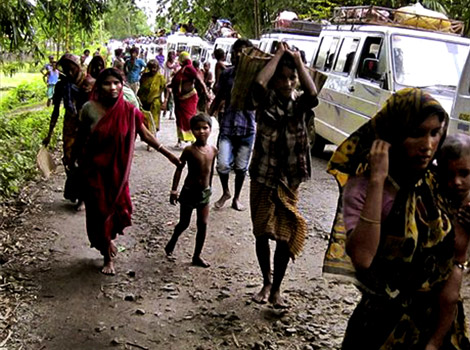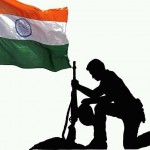Assam is burning as I write this.
Ethnic clashes between the Bodo tribes (Hindus) and “Bengali Muslims” (most of them being immigrants) have already consumed 40 lives and resulted in displacement of about 200,000 people from their homes. There are no railway connections now from other parts of the country to Guwahati, the state capital. Predictably, the Army has been called in to restore law and order.
If one goes by the photos appearing in the print and television media, then the majority of those affected by the violence appears to be the Bodos. However, the Assam chief minister Tarun Gogoi does not seem to be all that perturbed. With a Congress-led central government in Delhi, Gogoi, unlike the non-Congress chief ministers, has no reason to worry over the prospect of dismissal of his government, even though his record in ensuring communal amity in the state has always been far from inspiring. Excelling in the art of vote-bank politics, he has been out and out partisan in favour of the Bengali Muslims, majority of them being illegal immigrants from the neighbouring Bangladesh.
Bodos and Bengali Muslims had fought bitterly also in 2008. That time, it was the Muslims who had suffered more. In fact, there have been four major occasions of communal violence between the two communities in the last 60 years. Bodos, it may be noted, are the largest plains tribe in Assam, settled primarily in the northern bank of the Brahmaputra River. They once held sway over Assam only to be scattered and submerged in later times. Therefore, the Bodo leaders have been launching various agitations, often violent, to assert their rights, which have substantially impinged upon the territorial rights of the other communities in Assam.
They succeed first in extracting the Bodo Accord of 1993, which, unfortunately resulted in more instability. Because, it envisaged that Bodos will have primacy over the areas where their population exceeded 50 percent and such ‘Bodo Areas’ were to be brought under the direct administration of the Bodo Autonomous Council(BAC). What it resulted in was that Bodo extremists indulged in organised ethnic cleansing in areas where the Bodos did not yet constitute 50 percent of the population.
Today, out of the total 24 districts of Assam, six districts have 60 per cent Muslim population while another six have above 40 per cent of them… And all this has been due to the influx of the illegal immigrants from neighbouring Bangladesh.
Finally, in 2003, the Bodos settled with what was called the Bodoland Territorial Council (BTC) under the” Sixth Schedule” of the constitution “to fulfill economic, educational and linguistic aspirations and the preservation of land-rights, socio-cultural and ethnic identity of the Bodos; and speed up the infrastructure development in BTC area, called the Bodo Territorial Autonomous District (BTAD)”.
The BTAD consists of four contiguous districts — Kokrajhar, Baska, Udalguri and Chirang — carved out of eight existing districts of Dhubri, Kokrajhar, Bongaigaon, Brapeta, Nalbari, Kamrup, Darrang and Sonitpur – an area of 27,100 km² (35% of Assam).
But it seems that the BTC experiment is not working, given the ethnic clashes in 2008 and now. Bodos resent the continuous increase in the number of Bengali Muslims in their areas. It may be noted that it was in the erstwhile Darrang district in 1978 that authorities, while revising the electoral rolls for a Lok Sabha by-election to the Mangaldoi constituency, had discovered that a large number of infiltrators from Bangladesh had enrolled themselves as Indian voters. The incident triggered a the Assam Agitation that lasted six years—from 1979 to 1985 on the issue of illegal migration from Bangladesh. The period was marked by several violent incidents, including the Nellie carnage of 1983 when over 2,000 Muslim migrants were massacred in undivided Nagaon district on a single day.
It is obvious that real peace can never come to Assam until and unless the knotty issue of illegal immigration to the satisfaction of all the stakeholders. I have written earlier in this column how the Muslim population in Assam in between 1971 and 1991 increased 77.42 percent as against the figure of 41.89 percent by the Hindus. In between 1991 and 2001, the corresponding figures were 29.3 percent for Muslims and 14.95 for Hindus. It is not surprising therefore that today, out of the total 24 districts of Assam, six districts have 60 per cent Muslim population while another six have above 40 per cent of them. And, out of the 126 assembly seats, election of 54 MLAs (Members of Legislative Assembly) depends on the Muslim vote bank. And all this has been due to the influx of the illegal immigrants from neighbouring Bangladesh.
The threat was clearly enunciated when on July 23, 2008, the Guwahati High Court stated in a judgment: ‘Bangladeshis have become kingmakers in Assam.’
Of course, Illegal immigration from Bangladesh is not confined to Assam. Many parts of the country, including Delhi and Mumbai, are also affected by this phenomenon. According to Union Minister of State of Home Affairs Mullappally Ramachandran, “almost 1.4-million illegal Bangladeshis have migrated to India over the past decade alone”.
However, the fact remains that more than in other parts of the country, it is in Assam that these immigrants have been shattering the socio-economic- political balance. They not only occupy char areas in the riverine belt but also lead to the growth of unauthorised settlements in Government lands, agricultural lands, grazing reserves and forest areas. They compete with genuine Indians for jobs, thereby worsening the already serious unemployment problem. Then, there is the menace of their “bogus votes”; so much so that they may be able in near future to form their Government and have their own Chief Minister. The threat was clearly enunciated when on July 23, 2008, the Guwahati High Court stated in a judgment: ‘Bangladeshis have become kingmakers in Assam.’
Besides, Indian intelligence officials have often complained that Pakistan has fished in the troubled water in the sense that it, with active grassroots- support of Harakat ul-Jihad-I-Islami-Bangladesh (HUJI-B), Lashkar-e-Tayyaba and Jaish-e-Mohammad(all are notorious fundamentalist terrorist outfits in South Asia ), it has used its “agents” in the guise of immigrants to exacerbate the communal disharmony between the Hindus and Muslims in parts of the country and promote secessionist- terrorist activities. In fact, the intelligence agencies are apprehending their role in the current spate of violence in Assam.
It is not that Indian political leadership and officials are unaware of the problem, but then they, particularly the Congress, have tended to ignore it, the reason being “vote bank politics’. They have even tried to circumvent the Supreme Court which has struck down the Assam-specific IMDT (Illegal Migration Determination Tribunal) Act. When Assam vote-bank politics dictated passage of the Foreigners’ (Tribunals for Assam) Order, 2006, the Supreme Court struck it down again. The Supreme Court says that India cannot have two different sets of laws to detect illegal immigration. After all, the normal laws of the country say that the onus of proving “citizenship” is always on the accused. But the UPA government wants a different law for Assam where the burden of proving the citizenship or otherwise rests on the accuser and the police. And it justifies this absurdity (rather “illegality”) on the grounds of providing “special protections” against undue harassment to the “minorities”.
What a perverse logic, which is nothing but highly communal in a secular country such as ours!
Against this background, I would like to share a message that I had received years ago from a friend through e -mail. The readers can derive their own conclusions. The message was:
If You Cross The North Korean Border Illegally You Get 12 Years Hard Labour.
If You Cross The Iranian Border Illegally You Are Detained Indefinitely.
If You Cross The Afghan Border Illegally, You Get Shot.
If You Cross The Saudi Arabian Border Illegally You Will Be Jailed.
If You Cross The Chinese Border Illegally You May Never Be Heard Again.
If You Cross The Venezuelan Border Illegally You Will Be Branded A Spy And Your Fate Will Be Sealed.
If You Cross The Cuban Border Illegally You Will Be Thrown Into Political Prison To Rot.
If You Enter Britain Illegally You Will be Arrested, Prosecuted and Sent to Prison and Deported.
If You Are a Pakistani or a Bangladeshi and Illegally Cross the Indian Border You Get
- A Ration Card,
- Passport (one or more)
- Haz Subsidy,
- A Driver’s License,
- Voter Identity Card,
- Job Reservation,
- Special Privileges,
- Credit Cards,
- Subsidised Rent Or A Loan To Buy A House,
- Free Education,
- Free Health Care,
- A Lobbyist in New Delhi, With A Ready Television Channel & Group Of Expert Human Right Activists,
- The Right To Talk About Secularism, Which Was Not Heard Of Back Home,
- And Of Course, Voting Rights!





